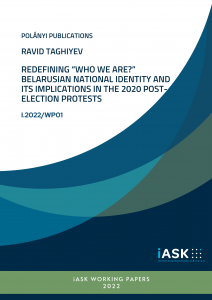Research & Studies
 About the Author
About the Author
Ravid Taghiyev is a Research Fellow at Polanyi Center of Institute of Advanced Studies Kőszeg (iASK). He holds an MA degree in International Studies from University of Pannonia Kőszeg Campus and BA degree in International Relations and Diplomacy from Qafqaz University (Azerbaijan). Currently, his academic interest is mainly related to social movements, civil society, and democratization in the Eastern European and post-Soviet countries. He is also interested in national identity and memory studies in the context of contentious politics and authoritarianism.
Abstract
The 2020 protests in Belarus created a unique socio-political situation for the country that has been described as “the last dictatorship of Europe”. The civic stance against the authoritarian regime in Belarus has produced a horizontal connection among the participants which, in return, shaped the overall socio-political narratives about national identity and statehood that have dominated the public sphere for almost three decades. Through the eyes of the Belarusian activists and intellectuals living in Poland and Lithuania, this research article explores the bottom-up fusion of ideological contention against the regime and formation of a more politicized society in Belarus.
Key words: social movements, democratization, national identity, post-socialism, Belarus, authoritarianism
I.2022/WP01Download